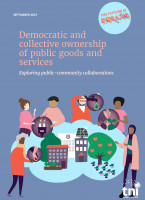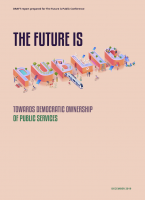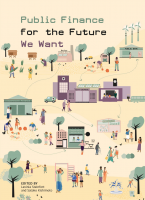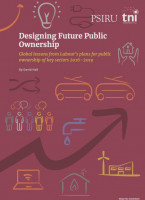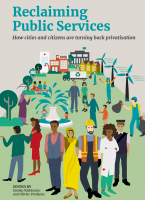Progressive Public Procurement Toolkit Building local democratic economies through public community partnerships
Progressive public procurement is gaining global momentum as governments prioritize social criteria in purchasing goods and services. Focused on strengthening workers' rights, reducing socio-economic inequalities, and fostering citizen participation, this approach transforms local economies. This report emphasizes community wealth-building through democratic ownership. Public community collaborations, as detailed in case studies, showcase the shift from global outsourcing to supporting local cooperatives and enterprises. This toolkit offers valuable lessons for policymakers, promoting transparent, participatory, and transformative public procurement practices worldwide.
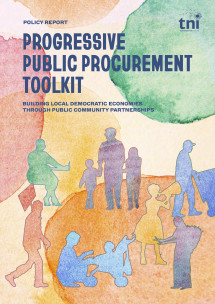
Descargas
-
Progressive Public Procurement Toolkit: Building local democratic economies through public community partnerships (PDF, 4.41 MB)Tiempo medio de lectura: 120 minutos*
-
Executive Summary: Progressive Public Procurement Toolkit (PDF, 2.86 MB)Tiempo medio de lectura: 10 minutos*
Autores
Progressive public procurement, the purchase of goods, services and works by the public sector under clearly defined social criteria, is gaining traction around the world. Governments and their agencies are turning to local and more social producers and service providers for the procurement of necessary goods and services, with the aim of spending public money in a way that benefits local communities and creates wealth for the many instead of the few.
-
strengthen workers’ rights by procuring from democratically governed member-owned coowperatives,
-
follow clear social goals to reduce existing socio-economic inequalities,
-
increase citizens’ and/or workers’ involvement by creating mechanisms for participation, and
-
re-invest public money to transform the local economy in ways that contribute to community wealth-building.
It highlights how progressive public procurement enables local authorities and communities to enhance collective and democratic ownership. This is in line with The Democracy Collaborative’s work to develop community wealth-building as an action-oriented approach that seeks to change the nature and operations of the local economy through claiming direct control over its assets so that it produces lasting outcomes that work for people, place and planet.
Through procuring public goods and services from democratically organised cooperatives and local or minority-owned businesses, public authorities create strong links between governments and citizens — so called public community collaborations. Building on TNI’s 2021 report Democratic and Collective Ownership of Public Goods and Services: Exploring public community collaborations, public community collaborations or partnerships present transformative ways in which citizens are actively involved in the work of government. Participatory approaches to public procurement further strengthen workers’ rights, trust in local governments, and transparency, and allow local economies to grow stronger as wealth is generated and reinvested into local communities. Through public community partnerships in public procurement, we can witness a shift from outsourcing public works to the lowest bidder on the global stage to awarding contracts to community-based enterprises, worker-owned cooperatives, family farmers, and minority-owned and women-led enterprises.
Each of the case studies presented in this toolkit provides unique tools for policy makers and procurement agents in local, regional and national govern- ments. While the legal, social and economic context in each locality is different, we aim to highlight broader lessons that can be learned from these examples, which may serve as inspiration as to how progressive public procurement practices could be co-created and consolidated in other contexts.
The case studies are a selection of the many diverse, innovative practices that already exist around the world. This report by no means paints a complete picture; there are probably other good practices that escaped our mapping. Instead, this preliminary research combines some highlights based on examples that were accessible to or already known by the authors, as well as practices we found in other reports.
While each case study provides valuable tools for public procurement agents, five themes resurface throughout the toolkit:
1. Local public value chains build community wealth
Procuring locally delivers added value to society, responding to the specific social and environmental concerns of a locality. It provides democratic con- trol over value chains and reduces negative impacts on the environment. It enables authorities and residents to actively participate in community wealth-building by leveraging the purchasing power of (local) government bodies and reinvesting public money into the communities they are anchored in. Cases from Zanzibar (Tanzania), Northland (Aotearoa/New Zealand), Kerala (India) and Qali Warma (Peru) showcase the enormous benefits of building public value chains. What’s more, the following themes on public collaborations, rural-urban solidarity, defending human rights and formal jobs, and popular participation can be best understood as core dimensions of community wealth-building.
2. Public community partnerships underpin a democratic economy
Creating a collaborative ecosystem consisting of public and community-based actors can resist privatisation and strengthen public collaboration. This is crucial to nurturing the social fabric and a democratic economy in which working people are increasingly in charge. Case studies from Kerala (India), Barcelona (Spain) and Belo Horizonte (Brazil) demonstrate that public-public relationships can replace the long-promoted but extractive public-private partnerships. Public community partnerships pave the way for a local economy that is democratically organised.
3. Public procurement can strengthen rural-urban solidarity
Progressive public procurement practices can re-invent rural-urban relation- ships that are often based on extracting wealth and resources from rural communities for the benefit of rich, urban actors. Local procurement can cre- ate shared wealth across the rural-urban spectrum. Examples from Rennes (France) and São Paulo (Brazil) highlight the benefits of formal procurement contracts between urban municipalities and rural farmers that value and sup- port agricultural workers and their produce, generating income security and more resilient ecosystems along the way.
4. Public procurement can defend human rights and formal jobs
Democratically elected representatives of local, regional, and national governments have a responsibility to defend and promote the human rights of citizens, workers, and discriminated communities who the capitalist prof- it-maximising system has been exploiting. By procuring goods and services from informal workers’ cooperatives as part of a pathway to establish progressive and worker-led formalisation, governments can contribute to social security and more stable incomes for impoverished community members, as cases from Belo Horizonte (Brazil), Pune (India), Recoleta (Chile) and Zanzibar (Tanzania) show. To sustainably formalise jobs and build public capacity in- house, local governments should enter into dialogue with workers to explore if they want to be hired as formal public sector servants, with the full rights, benefits and secure employment that should entail.
5. Popular participation improves public spending policies
Citizen participation is vital to ensure communities are able to decide together how public money is spent for the benefit of all members. A wide variety of approaches are emerging to enhance participation in the tendering process, with varying degrees of citizen involvement. Examples from Peru, the Philip- pines, Mexico and the Dominican Republic show how engaging groups such as parents, workers and people from discriminated groups on an ongoing basis can improve transparency and strengthen people’s control over public funds. Opening up spending policies to popular participation makes procurement better serve local needs and enables local authorities to earn the trust of their residents.
Governments and their agencies have control over public money; they have to decide whether to finance exploitative corporations or re-invest this money into their local communities. This report demonstrates that local public procurement can be a tool to strengthen economic democracy and contribute to community wealth-building through sourcing goods and services socially and locally. Public spending provides local governments and larger public authorities with the power to reclaim control over value chains, redirect privatised profits into the hands of their local communities, promote labour and other human rights, and support democratic enterprises. We hope that this Progressive Public Procurement Toolkit will inspire and assist many more communities to put this power into action.

